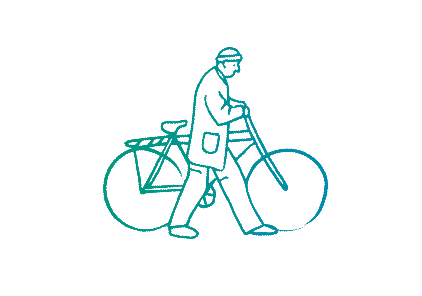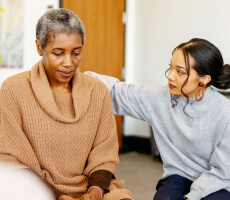Hygge: A Concept for Wellness
Kristin Hopper, a social worker with Cornerstone Centers for Wellbeing, discusses hygge, a Danish concept for wellness and contentment that can benefit hospice caregivers.
 Beautiful woman have relax at home with cup of tea and book. Young woman at home sitting on modern chair and relaxing in her living room reading book and drinking coffee or tea. Reading activity for adult.
Beautiful woman have relax at home with cup of tea and book. Young woman at home sitting on modern chair and relaxing in her living room reading book and drinking coffee or tea. Reading activity for adult.
The Fall season is officially here. Temperatures are decreasing, leaves are changing in some places and people are looking forward to the holidays. It can be an exciting time, but it can also have an effect on your overall wellness. The change in weather can often affect our mood and motivation and it’s not uncommon for some to feel down around this time. So, how do we make sure the changing of the seasons doesn’t bring on negative changes for our wellness? Researchers believe one solution comes from Denmark, which consistently ranks among the happiest countries on the planet, according to the annual World Happiness Report. They found the Danish concept of hygge (pronounced hoo-ga), which embraces coziness and life’s little pleasures, can be great not only your physical health, but also your mental well-being.
Benefits of Hygge
The whole hygge concept is geared towards feelings of contentment and nurturing connections, which according to a review published in 2018 in the Annual Review of Psychology, is especially beneficial to physical and emotional wellbeing. At home, a “hyggeligt” approach is where you can be perfectly yourself.
Overall, hygge carries a wide range of benefits including:
- Increase your feel-good hormones such as dopamine, which you can get from enjoying a favorite hobby. Physical activity can increase serotonin levels and release endorphins. These hormones help regulate your mood as well as pain relief, sleep, appetite, digestion, learning ability and memory. Oxytocin is often called the “love hormone”. Oxytocin is essential for childbirth, breastfeeding, and strong parent-child bonding. It can also help promote trust, empathy, and bonding in relationships. Levels generally increase with physical affection and quality time with loved ones.
- Decrease in the stress hormone known as cortisol. When we feel stress, our bodies will naturally produce cortisol. It is part of the natural fight-or-flight mechanism that keeps us alert. To reduce cortisol, you need to have a release. If our cortisol levels spike for a prolonged period of time, it can interfere with our learning, memory, immune functions, blood pressure, and cholesterol.
- Helping you be present in the moment, truly appreciating a moment and enjoying the feelings this brings.
- Improve your self-care and self-love to make sure you are the most important person in your life.
- Increase feelings of contentment which can help with feeling accomplished in your day-to-day activities.
- Combat maladaptive coping strategies, such as spending excessive time online or watching television, drinking too much alcohol or using drugs.
Six Ways to Incorporate Hygge Into Your Life.
1. Embrace Self-care
Create a comfortable environment that will allow you time to decompress. Manage the lighting in your space by using candles or low lighting. Have a comfortable space to sit to read, journal, or spend time with loved ones. Enjoy a sweet treat or warm drink. Hygge encourages you to dedicate time to yourself through the things that bring you the most comfort and joy. Don’t be hard on yourself for not being productive in that moment. Taking care of yourself IS productive.
2.Prioritize Tasks
Choose your top three most urgent tasks each day and make them a priority. When you put tasks off, they remain in the back of your mind and grow even bigger. Take control and promise yourself a reward when you finish.
3. Spend time in nature
Spending time outdoors has proven stress-relieving benefits and can help you connect to something bigger than yourself. A walk around your neighborhood, a local hiking trail or sitting outside are great ways to reset.
4. Connect with others
Social support is an important aspect of health and well-being. It’s about connecting with and enjoying each other’s company, not competing or trying to impress. Spending quality time with others also boosts feel-good oxytocin.
5. Slow down
If you allow yourself to slow down, you’ll relax your physiology and reduce your adrenal stress responses. We know that from mindfulness research that there are many health benefits to slowing down and being present in the moment.
6. Live in the moment
Hygge isn’t something you achieve, but rather components infused into your lifestyle. You don’t have to pressure yourself to do life perfectly. Life is a journey, not an end state.
Hygge can mean something to everyone. Simple comforts that are important to you can be easily attained without much cost. Take time to reflect on the activities, people and pets that help you create sanctuary and maintain balance in your life.
Chapters Health System is committed to serving the needs of its patients, families, caregivers, health providers, partners, and communities.
For more information, please call our helpful Chapters Health and HospiceHelp24® team at 1.866.204.8611 or Contact Us.
Keep Exploring
















